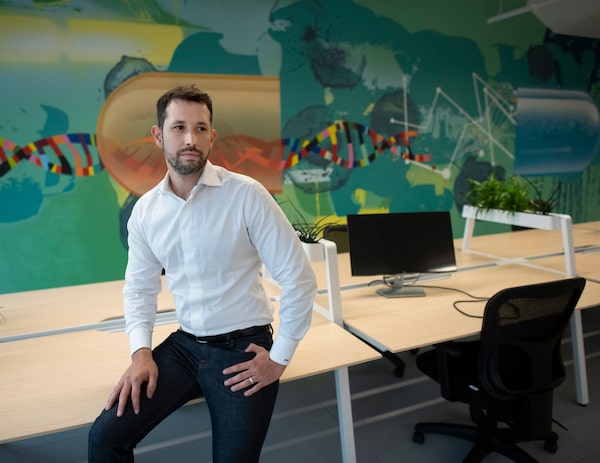
Liran Belanzon, CEO of AI company BenchSci, at the company’s new Toronto offices on July 27, 2021.Fred Lum/The Globe and Mail
Al Gore’s investment firm has led a $95-million financing of a Toronto company that uses artificial intelligence to help pharma giants cut time and costs from the drug discovery process.
Generation Investment Management, chaired by the former U.S. vice-president, led the growth equity financing of BenchSci Analytics Inc., with backing from past investors Inovia Capital and Golden Ventures of Canada, and U.S.-based TCV and F-Prime Capital Partners, affiliated with Fidelity’s founding Johnson family. It’s Generation’s third deal in Canada, after 2021 investments in AlayaCare Inc. and Benevity Inc.
Terms were not disclosed but Golden managing partner Matt Golden said it was a “clean deal” free of complex structured terms that financiers have increasingly demanded from startups to guarantee them a larger share of proceeds when they sell.
Multiple investors bid to lead the deal and BenchSci chief executive Liran Belenzon said it was “not a down round,” meaning the company at least maintained its valuation from when it raised US$50-million last year. The lack of structure or devaluation puts BenchSci in rare company amid a shakeout across the tech sector as companies run out of cash or face onerous funding offers from investors.
Mr. Belenzon said “we weren’t in a position where we needed to raise money, but that’s when I want to raise. We have lots of traction and I want to make sure we have a good war chest to continue meeting demands.” He added he expects venture capital investing levels “will only get worse” despite steep declines already in the past year.
Tom Czitron: How artificial intelligence will change the investing landscape
BenchSci deploys artificial intelligence to rapidly peruse millions of scientific publications. Tens of thousands of researchers use its online subscription software tool to quickly determine which antibodies (proteins the body develops to fight invasive substances) and reagents (substances that cause chemical reactions) would be best to use in early experiments on new medications.
BenchSci’s product is used by 16 of the world’s 20 largest pharmaceutical companies, which shave months and substantial costs off the search for new drugs. Novartis in its 2021 annual report said it saved US$14-million from 2018 to 2021, as scientists using BenchSci to select the best antibodies and reagents cut down on expensive and unproductive experiments and accelerated projects by months.
Anthony Woolf, growth equity partner with Generation, a social-impact sustainability-focused investor, said his firm heard “what I’d describe as wild customer love” for BenchSci during its due diligence research. “The largest biopharmaceutical companies are spending billions of dollars a year on their preclinical research and development teams, so any degree of efficiency is meaningful to them.”

BenchSci is working towards more diversity, equity, and inclusion initiatives in the company.Fred Lum/The Globe and Mail
He added there are relatively few software tools available for early drug researchers, and that BenchSci is a welcome response to “a massive innovation crisis” in preclinical research and development that has seen the cost of drug discovery skyrocket.
BenchSci was founded in 2015 by Tom Leung, David Chen, Elvis Wianda and Mr. Belenzon after they met through the Creative Destruction Lab at University of Toronto. It has grown rapidly since the start of the pandemic, more than doubling revenue over the past 18 months and expanding its team to more than 400 people from 100 in 2020. Mr. Belenzon forecast his company would double revenue again this year but didn’t disclose absolute figures.
Asked if he was concerned generative AI companies such as OpenAI could threaten BenchSci, Mr. Belezon replied: “I think every technology can be a threat if you don’t do anything about it. We will remain agile, adopt new technologies to help us solve the problem faster and never stop as an organization.”
Mr. Woolf at Generation added: “Our conclusion is that large language models” used in generative AI “are going to benefit BenchSci over time as long as they can incorporate it.”